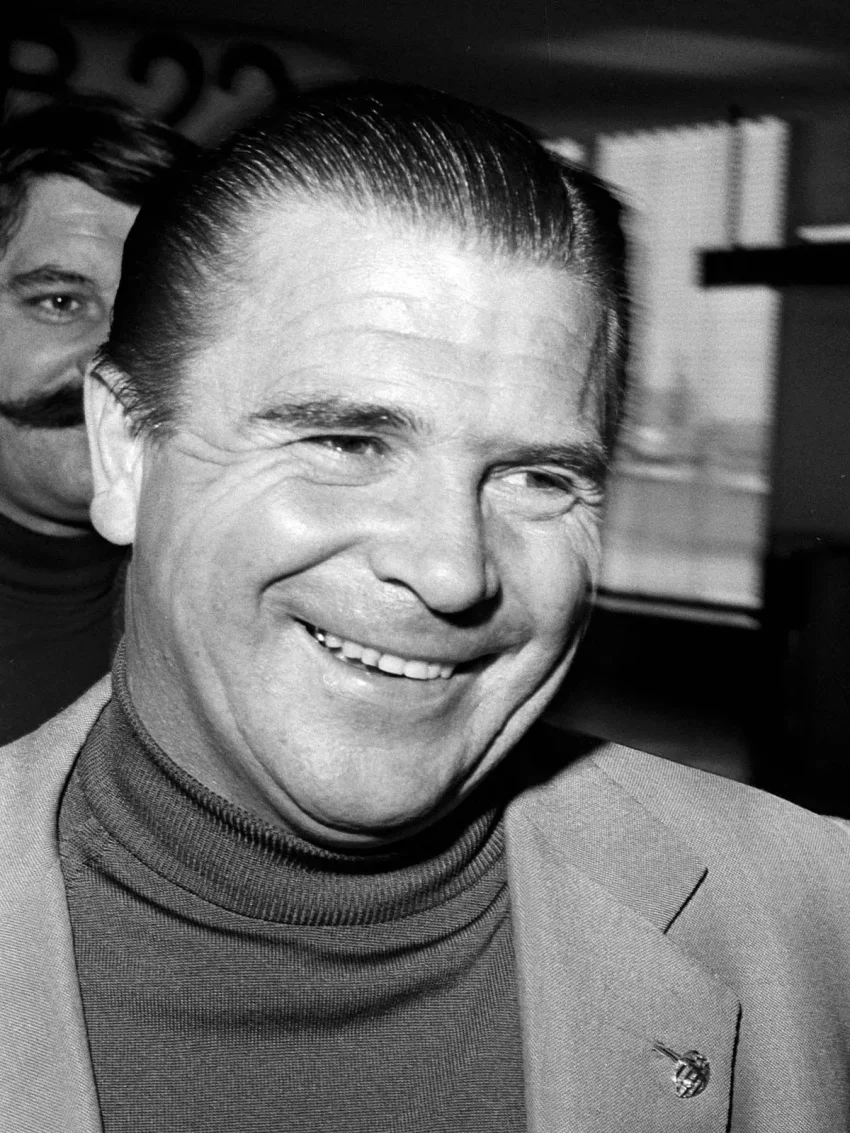Ferenc Puskás, a Hungarian football legend, is celebrated for his remarkable impact on the sport, making him one of the first international superstars in football history. Born in Budapest on April 1, 1927, Puskás achieved legendary status as a forward with scintillating skill and an extraordinary goal-scoring prowess, tallying an astounding 83 goals in 84 matches for the Hungarian national team. Renowned as a key player of the “Magical Magyars,” Puskás mesmerized fans during a golden era of football, leading Hungary to significant victories, including the 1952 Olympic gold medal. Later, as a Real Madrid superstar, he secured his legacy further by winning three European Cups and five league titles while amassing an impressive 242 goals in just 262 appearances. Puskás’s achievements and contributions to football continue to inspire generations, solidifying his place in the pantheon of greats in the sport’s history.
Known as one of the sport’s most iconic figures, Ferenc Puskás embodies the true essence of football greatness. His career was marked by incredible milestones that redefined the game, showcasing the perfect blend of skill, agility, and scoring genius. From piloting the famed Hungarian national team, often referred to as the “Magical Magyars,” to illuminating the fields of Real Madrid, his journey through football has left an indelible mark. Puskás’s influence extended beyond his playing days, as his legacy continues to resonate in discussions about the all-time greats of the sport. This exploration of his life and achievements reveals the pivotal role he played in shaping football as we know it today.
The Rise of Ferenc Puskás in Hungarian Football
Ferenc Puskás, the Hungarian football legend, began his career in the small town of Kispest, showcasing his immense talent from a young age. He debuted for the Honved football club at just 16 years old, quickly establishing himself as a prominent figure in Hungarian football. During his time at Honved, Puskás was instrumental in winning five Hungarian championships between 1949 and 1955, demonstrating exceptional skills and an impressive left-footed shot that earned him recognition as a formidable striker in Europe. His early success laid the groundwork for his future achievements on both national and international stages.
Throughout the late 1940s and early 1950s, Puskás became a key player for the Hungarian national team, also known as the “Magical Magyars.” His incredible scoring ability and football intelligence propelled Hungary to unprecedented success, with an astounding record of 43 wins in 51 matches between 1950 and 1956. Puskás’s contributions were pivotal in securing the gold medal at the 1952 Helsinki Olympic Games, further cementing his legacy as one of the greats of football history. His relentless drive for excellence and mesmerizing performances captivated fans and established him as a national icon.
Puskás and the Glory at Real Madrid
After defecting to Spain during the Hungarian Revolution, Puskás joined the prestigious Real Madrid in 1958, where he quickly became a superstar. Teaming up with the legendary Alfredo Di Stefano, the duo formed one of the most potent attacking partnerships in football history. Puskás’s natural goal-scoring instinct and technical prowess contributed to his remarkable tally of 242 goals in just 262 matches for the club. His time at Real Madrid was marked by incredible success, including five consecutive La Liga championships and three European Cup titles from 1958 to 1966, further enhancing his reputation as a footballing great.
The influence of Puskás on Real Madrid cannot be overstated. He was not only a prolific scorer but also a player who brought flair and creativity to the field. His performances in high-stakes matches elevated the club’s status in European football, making Real Madrid synonymous with success during the 1960s. Puskás’s legendary status was solidified further with his induction into the club’s history as one of its all-time leading scorers, ensuring that his legacy endures among future generations of football fans.
The Influence of the Magical Magyars on Modern Football
The Magical Magyars, the nickname for the Hungarian national team in the 1950s, played a transformative role in the evolution of football tactics. Under the influence of coach Gusztáv Sebes, this team introduced innovative formations and strategies that challenged conventional methods. Ferenc Puskás, as a key figure, exemplified these tactical advancements through his adaptable playing style and extraordinary vision on the pitch. The team’s ability to execute fluid attacking plays set a standard that continues to inspire modern football tactics.
The impact of the Magical Magyars extended beyond their era, influencing legendary teams and players worldwide. Their mixture of skill, teamwork, and creativity captivated audiences and showcased the beauty of the sport. Future generations of footballers have drawn inspiration from Puskás and his teammates, with many football academies adopting their principles to develop young talent. This legacy not only highlights Puskás’s significance in football history but also underscores the enduring influence of the Magical Magyars on the game’s global evolution.
Puskás’s Unforgettable Achievements and Legacy
Ferenc Puskás’s achievements on the pitch are a testament to his hard work and dedication to the sport. He is celebrated not only for his goal-scoring prowess, which included a remarkable record with the Hungarian national team, but also for his influence on football culture and history. Puskás became synonymous with excellence, and his unique playing style inspired countless athletes who followed in his footsteps. His accolades, including three European Cup victories and numerous league titles, have firmly established him among the pantheon of football greats.
Beyond his achievements, Puskás’s legacy as a pioneer of the sport inspires new generations. Upon retiring from playing, he transitioned into coaching, further promoting the game’s growth, particularly in Spain. His return to Hungary later in life, culminating in the renaming of a stadium in his honor, reflects the deep respect and admiration he earned throughout his career. Puskás’s story continues to resonate with fans and aspiring footballers, proving that excellence on the field can transcend time and cultural boundaries.
The Importance of Puskás in Global Football
Ferenc Puskás’s significance in football transcends national pride; he represents a pivotal figure in the birth of modern football. His unique style, characterized by technical skill and finesse, has drawn admiration from fans and players worldwide. Puskás’s impact was not limited to his playing career; his efforts in promoting football as a popular sport helped lay the groundwork for its growth on a global scale. He became a global ambassador for the game, demonstrating the universal appeal of football and its ability to unite people across borders.
His role in elevating the standards of professional football during his time cannot be overstated. By competing at the highest levels in both Hungary and Spain, Puskás set a benchmark for aspiring players worldwide. He is often cited as a source of inspiration for modern footballers who aspire to amalgamate power, technique, and creativity in their gameplay. Puskás’s story serves as a reminder of how the sport can shape lives and create legacies that endure long after the final whistle.
Frequently Asked Questions
What are some notable achievements of Ferenc Puskás in football history?
Ferenc Puskás, the Hungarian football legend, achieved remarkable success throughout his career. He scored an astounding 83 goals in 84 matches for the Hungarian national team and was a vital part of the ‘Magical Magyars.’ Puskás also won three European Cups with Real Madrid and earned five Hungarian championships with Honved.
How did Ferenc Puskás influence the game of football?
Ferenc Puskás, a Real Madrid superstar, greatly influenced football with his exceptional skills, particularly his powerful left-footed shots. As a key player for the ‘Magical Magyars,’ he contributed to one of the most dominant teams in football history, showcasing artistry and tactical awareness that changed the game.
What impact did Puskás have on Real Madrid during his tenure?
During his time at Real Madrid, Ferenc Puskás became the club’s iconic figure, scoring 242 goals in 262 appearances. His partnership with Alfredo di Stefano led the team to five consecutive league titles from 1961 to 1965 and three European Cup titles, solidifying his legacy as one of the greatest players in football history.
Why is Ferenc Puskás remembered as a Hungarian football legend?
Ferenc Puskás is remembered as a Hungarian football legend due to his incredible scoring record, leading the national team during its golden era. His contributions to the ‘Magical Magyars’ and success at Real Madrid highlight his impact on the sport, making him an enduring figure in football history.
What is the significance of the Puskás award in modern football?
The Puskás Award, named after Ferenc Puskás, honors the most aesthetically significant goal scored in a calendar year. This recognition reflects Puskás’s legacy as an iconic football figure and celebrates exceptional talent in the game, ensuring his influence persists in contemporary football.
How did Ferenc Puskás’s career start in Hungarian football?
Ferenc Puskás began his career in Hungarian football at age 16 with Kispest Honvéd, where he quickly became a prominent player. His early achievements included winning five Hungarian championships and being the top goalscorer in Europe in 1948, laying the foundation for his legendary status.
What was Ferenc Puskás’s role in the 1954 World Cup final?
In the 1954 World Cup final, Ferenc Puskás played an essential role for the ‘Magical Magyars.’ Despite battling an ankle injury, he helped lead Hungary to the final, where they faced West Germany but suffered a disappointing 3-2 loss, marking one of the most surprising results in football history.
When and why did Ferenc Puskás defect to Spain?
Ferenc Puskás defected to Spain in 1956 while playing in a match in Spain during the Hungarian Revolution. Seeking to escape the political turmoil back home, he joined several teammates in finding refuge in Spain, eventually signing with Real Madrid in 1958.
What legacy did Ferenc Puskás leave in Budapest?
Ferenc Puskás’s legacy in Budapest is honored through several tributes, including the renaming of the Budapest stadium to the Puskás Stadium in 2002. His contributions to Hungarian football and global sports continue to inspire generations of players and fans.
| Element | Details |
|---|---|
| Full Name | Ferenc Puskás |
| Date of Birth | April 1, 1927 (celebrated on April 2) |
| Place of Birth | Budapest, Hungary |
| National Team Goals | 83 goals in 84 appearances |
| Club Career | Played for Honvéd and Real Madrid |
| Major Achievements | 3x European Cup winner (1959, 1960, 1966) |
| Olympic Gold Medal | 1952 Helsinki Olympic Games |
| Nickname | The |
| Career Highlights | Top goalscorer in Europe (1948), member of the ‘Magical Magyars’ |
| Defection | Defected to Spain during the Hungarian Revolution (1956) |
| Retirement | Retired in 1966; became a coach afterwards |
Summary
Ferenc Puskás was a legendary footballer who made an indelible mark on the sport, establishing himself as one of the greatest players of all time. His incredible goal-scoring prowess for both the Hungarian national team and Real Madrid, alongside his role in the celebrated ‘Magical Magyars,’ highlights his impact in football history. Puskás’s journey from a young boy in Hungary to becoming an international superstar is a testament to his exceptional talent and resilience.








